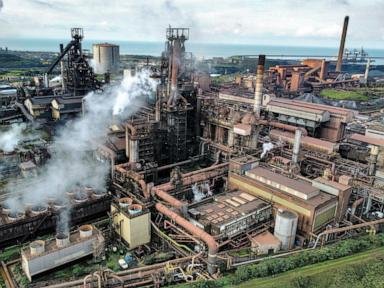LONDON — Indian firm Tata Steel announced Friday it will close both blast furnaces at its plant in Port Talbot, Wales, eliminating 2,800 jobs, as part of plans to make its unprofitable U.K. operation leaner and greener.
Tata plans to switch from coal-fired blast furnaces to an electric arc furnace, which emits less carbon — and needs fewer workers — using a half-billion pound ($634 million) investment from the British government.
The company said the switch would “reverse more than a decade of losses and transition from the legacy blast furnaces to a more sustainable, green steel business.”
“The course we are putting forward is difficult, but we believe it is the right one,” Tata Steel Chief Executive T.V. Narendran said.
The company said it expects about 2,800 jobs will be eliminated — 2,500 of them in the next 18 months, with a further 300 at longer-term risk. Both blast furnaces are due to be shut this year, with the new electric furnace installed by 2027.
The news is a major blow to Port Talbot, a town of about 35,000 people whose economy has been built on the steel industry since the early 1900s.
Unions have called for one blast furnace to remain open while the electric one is built, which would have meant fewer job cuts. They say Tata rejected their proposal.
The Unite union said it would “use everything in its armory” to fight job losses, including potential strikes.
At its height in the 1960s, the Port Talbot steelworks employed around 20,000 people, before cheaper offerings from China and other countries hit production. More than 300,000 people worked in Britain’s steel industry in 1971; by 2021 it was about 26,000.
The steel industry now accounts for 0.1% of the British economy and 2.4% of the country’s greenhouse gas emissions, according to research by the House of Commons Library.
Tata warned in 2022 that its U.K. operations were under threat unless it secured government funding to help it move to less carbon-intensive electric arc furnaces.
Last year the U.K. government gave Tata up to 500 million pounds ($634 million) to make the Port Talbot steelworks greener. Tata says it is investing a further 750 million pounds ($950 million) in the project.
The company said switching to the electric furnace, which produces steel from scrap metal, would “secure most of (the plant’s) capability in terms of end products” while cutting its carbon emissions by about 85%.
The British government said the investment would “transform the site and protect thousands of jobs — both in Port Talbot and throughout the supply chain.” It said the move to electric furnaces would “secure a sustainable and competitive future for the U.K. steel sector.”
The GMB and Community unions, which both represent workers at Port Talbot, said “it’s unbelievable any government would give a company 500 million pounds to throw 3,000 workers on the scrapheap.”
The announcement is the latest blow to the economy in Wales, a former industrial heartland whose mines and mills have largely shut since the 1980s.
Opposition politicians criticized Prime Minister Rishi Sunak’s Conservative government, saying it failed to stand up for British industry.
Economy Minister Vaughan Gething, a member of the Labour Party-led Welsh government, said “today’s news is a cause of real grief and upset as well as anger from the community here.”
“It’s a devastating blow for this community — not just the steel workers who have been told about the extraordinary level of job loss, but the wider community,” he said. “It’s not a community that has a significant amount of well paid employment around it to replace the scale of the job losses that have been proposed.”
Even the Green Party in Wales criticized Tata’s decision, despite its environmental benefits.
“Wales knows only too well what happens when communities are abandoned by government and industries,” said its leader, Anthony Slaughter. “We saw it with the coal industry and now it is happening again with the steel industry.
“Decarbonization of industry is vital, but communities and people’s jobs must be protected,” he said.
